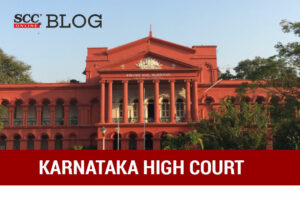Karnataka High Court: While deciding the instant matter wherein the petitioner was accused of inducing the respondent’s consent for sexual intercourse under false pretext of marriage, the bench of M. Nagaprasanna, J*., observed that consent of a woman on a promise to marry is always an enigma. The Court quashed the charge sheet insofar as offences punishable under Sections 376, 376(2)(n), 354, 406 and 504 of the IPC while pointing out that ‘consent’ in the case at hand is not once, twice or thrice; not for days or months; but for five years precisely, as narrated in the complaint as the two were in love. Therefore, for five long years, it cannot be said that the consent of a woman has been taken for having sexual acts, all along against her will. It is the length of the relationship and the acts in such period of such relationship between the two that takes away the rigor of ingredients of Section 375 of the IPC, for it to become an offence under Section 376 of the IPC.
The petitioner (accused) and the respondent (complainant) had come into each other’s acquaintance via a common friend. The relationship between the parties started with friendship and blossomed into a romantic liaison which paved the way towards sexual relationship, that went on for years. The petitioner and the respondent had known each other for 12 years and had been in a relationship for 5 years.
The relationship went this way a long period, which led to the respondent filing a complaint that on the pretext of marriage, the petitioner had sexual intercourse with the respondent and has later breached the promise of marriage. It was alleged that consent of the respondent vis-à-vis sexual relations was obtained on false promise of marriage.
In order to decide the matter, the Court perused the facts, contentions of the parties, the complaint filed by the respondent and the respondent’s statement under S. 164 of CrPC. The Court noted that the crux of the complaint appeared to be several financial transactions between the two.
It was further pointed out that if the complaint and the respondent’s statement under S. 164 is read in juxtaposition, then it becomes clear that the parties were in love and had indulged very often in sexual acts. The statement under S. 164 also makes it clear that petitioner had made hectic efforts to get married to the complainant. The family of both the petitioner and the complainant were known to each other. Talks of marriage did take place but failed. The failure was on account of consensus not being arrived due to caste equations.
The Court further pointed out that the respondent’s statement narrates that the petitioner has had sexual intercourse with her, initially forcibly, but the said force cannot be seen to continue for five long years. The narration would clearly indicate that the relationship between the petitioner and the respondent was consensual.
The Court stated that if the sexual relationship between the parties is consensual, then it cannot be alleged that it would become an ingredient of rape under S. 375 of the IPC, for it to become punishable under S. 376 of the IPC.
Relying to several case laws decided by the Supreme Court and referring to Kerala High Court’s decision in Ramchandran v. State of Kerala, 2022 SCC Online Ker 1652, the Court found that the relationship between the parties was a consensual one, therefore the Court must exercise its jurisdiction under Section 482 of CrPC, to obliterate the crime registered against the petitioner for the offence of rape under Section 376 of the IPC, failing which, it would become an abuse of the process of law.
Holding that length of the relationship and acts done within this period, becomes important factors to consider while determining the rigour of ingredients under Ss. 375 and 376, IPC, the Court partly allowed the petition.
[Mallikarjun Desai Goudar v. State of Karnataka, 2023 SCC OnLine Kar 8, decided on 28-02-2023]
*Judgement was authored by Justice M. Nagaprasanna.
Advocates who appeared in this case :
Petitioner- Chetan Desai, Advocate;
Respondents- K.S. Abhijith, HCGP for R1;
Veena J. Kamath, Advocate a/w Lekha G.D., Advocate for R2.

